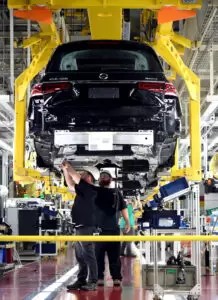On September 30, 1993, a moment arrived that would redefine Alabama’s economic trajectory. Executives from Mercedes-Benz journeyed to Tuscaloosa, Alabama, bearing news that would reverberate throughout the global business landscape. After an extensive search across at least 30 states for their inaugural U.S. manufacturing site, Mercedes-Benz chose Alabama.
For many, this announcement was unexpected. Alabama, at the time, lacked a significant automotive manufacturing history. However, nestled just outside Tuscaloosa, a 900-acre expanse of rolling land dotted with pine trees captured Mercedes-Benz’s vision.
The initial investment of $400 million, earmarked for a facility employing 1,500 individuals, quickly evolved into something far grander. The arrival of the Mercedes plant in AL marked a pivotal juncture, dividing Alabama’s economic history into “Before Mercedes” and “After Mercedes.”
 Mercedes-Benz Alabama workforce at the Tuscaloosa plant
Mercedes-Benz Alabama workforce at the Tuscaloosa plant
Fast forward to 2023, and the Mercedes-Benz footprint in Alabama has expanded dramatically. Over $7 billion has been invested in the Alabama operation through numerous expansions, boosting the workforce in Tuscaloosa County to over 6,300. The Mercedes Plant Al has produced over 4 million vehicles, a testament to its sustained growth and impact.
Crucially, the establishment of the Mercedes plant in AL acted as a catalyst, attracting other major automakers to the state. Drawn by Alabama’s favorable business environment, including competitive costs, robust worker training initiatives, a substantial labor pool, and its right-to-work status, companies like Honda, Hyundai, and Mazda-Toyota followed suit.
Today, alongside the pioneering Mercedes plant al, Alabama hosts large-scale assembly plants for Honda, Hyundai, and the Mazda-Toyota partnership. Toyota also operates a significant engine plant in the state. This concentration of automotive giants has solidified Alabama’s reputation as a leading automotive powerhouse in the United States.
Governor Kay Ivey emphasized the industry’s transformative impact: “The auto industry has been the primary engine of economic growth across Alabama for over two decades, providing high-paying careers and first-class workplaces. Its impact has been massive, and its future in our state is even brighter.”
Alabama’s automotive industry’s growth has been nothing short of meteoric. Since the first Mercedes-Benz M-Class vehicle rolled off the assembly line in February 1997, over 15 million vehicles have been produced in Alabama. The combined annual production capacity of the state’s auto plants now exceeds 1.3 million vehicles, placing Alabama among the top automotive manufacturing states in the U.S.
Direct employment in Alabama’s automotive manufacturing sector has surged to over 50,000, a dramatic increase from just a few thousand in 1997. Motor vehicles have become Alabama’s top export, with exports valued at $11.2 billion in 2023. This export volume earned Alabama the No. 1 ranking among U.S. states for vehicle exports for the first time.
Alabama’s five major automakers have collectively invested approximately $15 billion in their assembly operations across the state, according to the Alabama Department of Commerce. This substantial investment underscores the automotive industry’s vital role as a dynamic growth engine for Alabama’s economy. Furthermore, ongoing investment, particularly in electric vehicle (EV) production, signals continued expansion.
Since 2020, auto manufacturers in Alabama have invested around $2.1 billion in EV-related infrastructure, creating nearly 2,500 new jobs. This commitment to the future of automotive technology is reinforced by Alabama’s dedication to workforce development.
AIDT (Alabama Industrial Development Training), the state’s primary workforce development agency, announced plans in November 2023 to construct a $30 million workforce training center in Decatur. This facility, located at the Alabama Robotics Technology Park, will focus on electric vehicles and advanced manufacturing technologies, ensuring Alabama’s workforce remains at the forefront of the evolving automotive landscape.
Ed Castile, Director of AIDT, highlighted the agency’s long-standing partnership with the automotive sector: “Our main goal is to support the continued growth of Alabama’s automakers during the transition to electric powertrains and assist them in adopting new technologies. We are committed to ensuring our workforce can thrive in this new environment.” AIDT has been integral to the growth of Alabama’s auto industry since its inception, assisting Mercedes-Benz in assembling and training its initial workforce. Over three decades, AIDT has provided automotive training to over 125,000 individuals.
Alabama’s automotive industry is actively embracing the shift towards electric vehicles, with the Mercedes plant AL once again leading the charge. A $1 billion investment is spearheading EV production at the Tuscaloosa facility, already recognized as one of the world’s most advanced manufacturing plants.
In August 2022, Mercedes-Benz marked the production launch of its luxury EQS SUV at the Mercedes plant AL, shortly after opening a state-of-the-art battery assembly plant in Alabama. The Mercedes plant AL also produces the EQE SUV, further solidifying its role in Mercedes-Benz’s EV strategy.
Hyundai’s Alabama plant is also producing EVs, including the Genesis Electrified GV70 and a plug-in hybrid electric Santa Fe SUV, backed by a $300 million investment in its Montgomery facility. Adding to the EV supply chain, Hyundai Mobis is developing a $205 million EV battery module plant in Montgomery, set to create up to 400 jobs.
Ellen McNair, Secretary of the Alabama Department of Commerce, emphasizes the forward-looking approach of Alabama’s auto sector: “Alabama’s auto industry has been a dynamic growth engine, and I am confident it will be ready for its next chapter as the EV evolution reshapes the industry. Our auto manufacturing sector boasts serious horsepower and is just getting started in this new age.” The Mercedes plant AL, from its groundbreaking arrival to its current EV leadership, continues to be a driving force behind Alabama’s automotive revolution.
